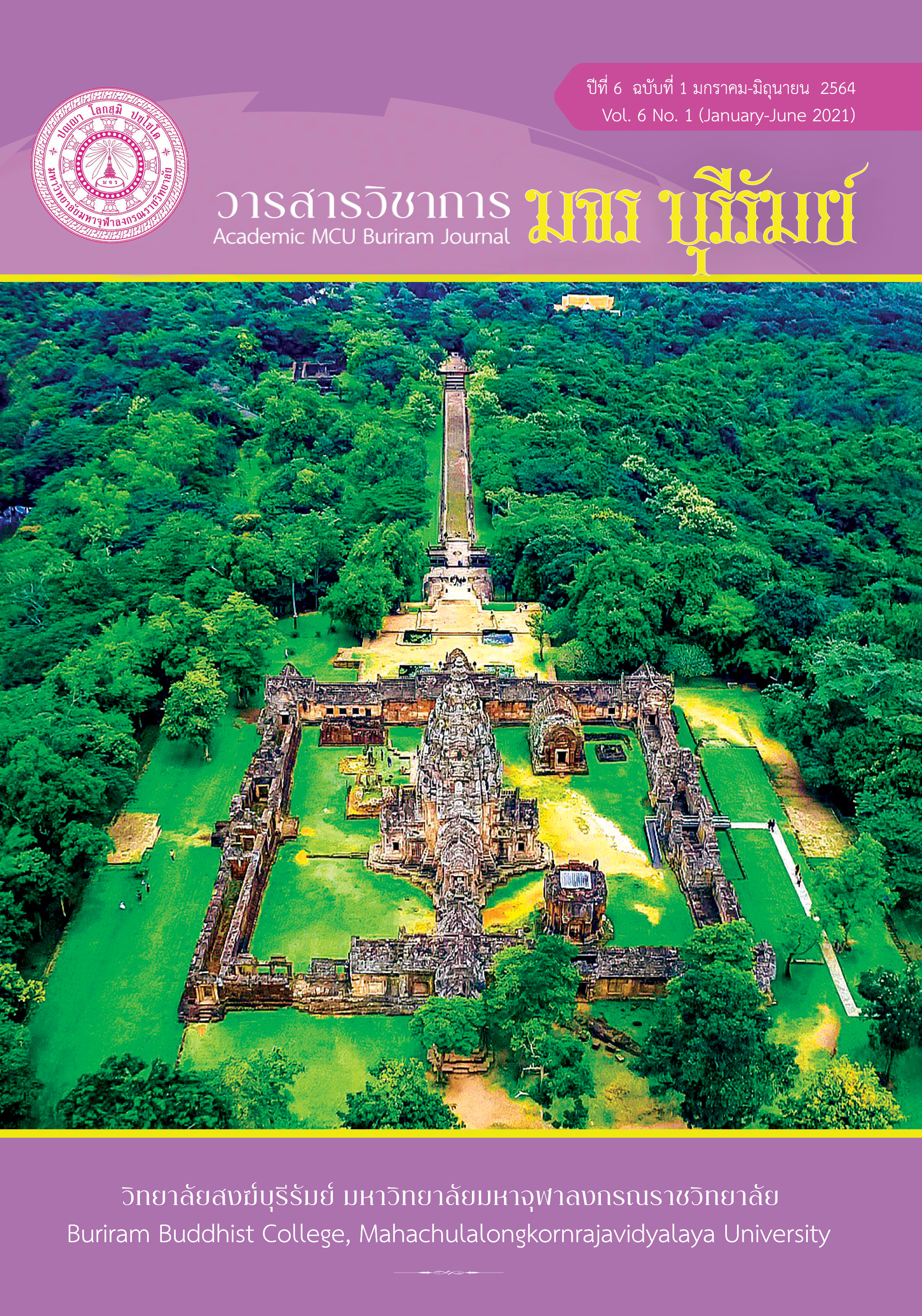The Promoting of Buddhist Instigative Politics Participation of the People in Nakhon Ratchasima Province
Keywords:
Promotion, Political Participation, Buddhist IntegrationAbstract
This research article has objectives: 1) to study the concept, the theory and political participation according to Buddhism, 2) to study the status and problem of political participation of the people in Nakhon Ratchasima Province and 3) to study the promotion of Buddhist Integrative political participation of people in Nakhon Ratchasima Province by conducting interviews and discussion areas of the population of 126 persons (including monks), in Nakhon Ratchasima Province.
The research result finds that:
The conditions and problems of political participation of the people in Nakhon Ratchasima Province were (1) the problem of lack of consciousness, this is a problem that arises from the lack of consciousness of politicians who have promised, lack of realization or virtues that many follow, (2) the problem of slander, words arising from this malice. It is the main issue in blackening, (3) the issue of monopoly, it was caused by a monopoly authority because by power of money. and (4) the problem of being blocked, it is a problem on the part of the people and the government or politicians who do not have roles or express their thoughts.
The promotion of Buddhist Integrative political participation of people in Nakhon Ratchasima Province can adhere to the following 4 principles : 1. Promotion of principles, models and processes of participation must adhere to the principles of Buddhism as follows; 1) perception, communication, and political participation of the people in Nakhon Ratchasima Province must understand Buddhist of communication principles, 2) decision-making, promoting decision-making participation should adhere to the Yonisamanasikarn principle in Buddhism. Because it is the use of thinking process to take part and 3) the correct practice, it must adhere to the principle of right view because the principle of right view creates peace, it is no trouble, no confusion, no chaos. 2. Promoting participation in public policy, the participation of the political sector must be firm and stable to build confidence among the people. 3. Participation in the nomination of the law, it should be based on the principles of public or volunteerism which are: 1) creating self discipline, to aware of participation in society. 2) focusing on the environment, recognize that you are a one part of society, 3) realizing the problems and their impacts on society, there is always thinking that it is your own problem as well, 4) adhere to the principles of life, because the doctrine or doctrine in all religions teaches us all to do good, and 4. Promoting participation in referendum voting, which is based on human rights.
References
ขนิษฐา หอมตะโก. (2562). การมีส่วนร่วมของประชาชนในการขับเคลื่อนนโยบายสาธารณะด้านสิ่งแวดล้อมของสมัชชาสุขภาพจังหวัด ภาคใต้ตอนบน. วารสารสหวิทยาการวิจัย, 8(1), 67.
จิดาภา เร่งมีศรีสุข. (2556). ยุทธศาสตร์การพัฒนาจริยธรรมาภิบาลขององค์กรปกครองส่วนท้องถิ่นในเขตภาคกลาง. วิทยานิพนธ์พุทธศาสตรดุษฎีบัณฑิต. บัณฑิตวิทยาลัย: มหาวิทยาลัยมหาจุฬาลงกรณราชวิทยาลัย.
จังหวัดนครราชสีมา.(2563). การปกครองในจังหวัดนครราชสีมา.http://www. nakhonratchasima.go.th (14 สิงหาคม 2563).
ถวิลวดี บุรีกุล และคณะ. (2551). ระบบการบริหารราชการแบบมีส่วนร่วมระดับจังหวัด:ทำอย่างไรให้เป็นจริง. กรุงเทพมหานคร: สถาบันพระปกเกล้า.
พรเลิศ สุทธิรักษ์ และนายสิทธิกร ศักดิ์แสง. การมีส่วนรวมทางการเมืองโดยตรงของประชาชนในการเข้าชื่อเสนอกฎหมาย (Initiative Process). งานวิจัย. https://www.facebook.com (2 กรกฎาคม 2563).
พระราชธรรมมุนี (เกียรติ สุกิตฺติ). (2550). เกี่ยวกับอินเดีย. กรุงเทพมหานคร: ม.ป.ท.
พระพรหมคุณาภรณ์ (ป.อ.ปยุตฺโต). (2551). พจนานุกรมพุทธศาสน์ ฉบับประมวลศัพท์. พิมพ์ครั้งที่ 16. กรุงเทพมหานคร: บริษัท สหธรรมิก จำกัด.
มหาจุฬาลงกรณราชวิทยาลัย. (2539). พระไตรปิฎกภาษาไทย ฉบับมหาจุฬาลงกรณวิทยาลัย. กรุงเทพมหานคร: โรงพิมพ์มหาจุฬาลงกรณราชวิทยาลัย.
ศุภชัย ยาวะประภาษ. (2548). นโยบายสาธารณะ. พิมพ์ครั้งที่ 6. กรุงเทพ: สำนักพิมพ์แห่งจุฬาลงกรณ์มหาวิทยาลัย.
สิรภพ สวนดง. (2563). รูปแบบการพัฒนาภูมิปัญญาและประเพณีเชิงพุทธกับการส่งเสริมการเรียนรู้ของประชาชนในเขตอีสานใต้. วารสารวิชาการ มจร บุรีรัมย์, 5(1), 148.
อรนุช โจมจตุรงค์. (2549). การมีส่วนร่วมทางการเมืองของประชาชนเกี่ยวกับการเลือกตั้งสมาชิกสภากรุงเทพมหานครเขตประเวศ กรุงเทพมหานคร. วิทยานิพนธ์ปริญญารัฐประศาสนศาสตรมหาบัณฑิต. บัณฑิตวิทยาลัย: มหาลัยบูรพา.
จักรวุธ ไตรวัลลภ. (19 กรกฎาคม 2563). อดีตผู้สมัคร สส.เขต 1 พรรคไทยธรรม อำเภอเมือง จังหวัดนครราชสีมา. สัมภาษณ์.
ชัชเวศย์ เหิมหาญ. (6 กันยายน 2563). อดีตผู้สมัคร สส.เขต 3 พรรคไทยธรรม อำเภอเมือง จังหวัดนครราชสีมา. สัมภาษณ์.
ดารา เกตุกะโกมล. (24 สิงหาคม 2563). ประธานสภาองค์กรชุมชนระดับตำบลจังหวัดนครราชสีมา อำเภอเมือง จังหวัดนครราชสีมา. สัมภาษณ์.
ธรรมรงค์ศักดิ์ ไสย์ราม. (10 ตุลาคม 2563). อดีตผู้สมัคร สส.พรรคประชาชาติ อำเภอเมือง จังหวัดนครราชสีมา. สัมภาษณ์.
นงลักษณ์ สงวนศักดิ์. (15 ตุลาคม 2563). อดีตผู้ช่วยนายทะเบียนพรรคไทยธรรม อำเภอเมือง จังหวัดนครราชสีมา. สัมภาษณ์.
พิทักษ์ สมบูรณ์. ดร. (22 กรกฎาคม 2563). ปลัดเทศบาลตำบลหนองไผ่ล้อม อำเภอเมือง จังหวัดนครราชสีมา. สัมภาษณ์.
พิษณุ ประจิตร, พ.ท. อดีตข้าราชการทหาร ค่ายสุรธรรมพิทักษ์ อำเภอเมือง จังหวัดนครราชสีมา. สัมภาษณ์.
ภัณฑิต พรหมราช, ร.ต.ต. (3 ตุลาคม 2563). กรรมการที่ปรึกษา อำเภอเมือง จังหวัดนครราชสีมา. สัมภาษณ์.
สำเริง เกตุทองคำ. (14 สิงหาคม 2563). คณะกรรมการคุมประพฤติ อำเภอปากช่อง อำเภอเมือง จังหวัดนครราชสีมา. สัมภาษณ์.
อัศวิน สุขสมวัฒวน์, ร.ต. (28 ตุลาคม 2563). รองประธานกรรมการ อำเภอเมือง จังหวัดนครราชสีมา. สัมภาษณ์.
Downloads
Published
How to Cite
Issue
Section
License
ทัศนะและความคิดเห็นที่ปรากฏในบทความวารสารฉบับนี้ถือเป็นความรับผิดชอบของผู้เขียนบทความนั้น ไม่ถือเป็นทัศนะและความรับผิดชอบของบรรณาธิการ





